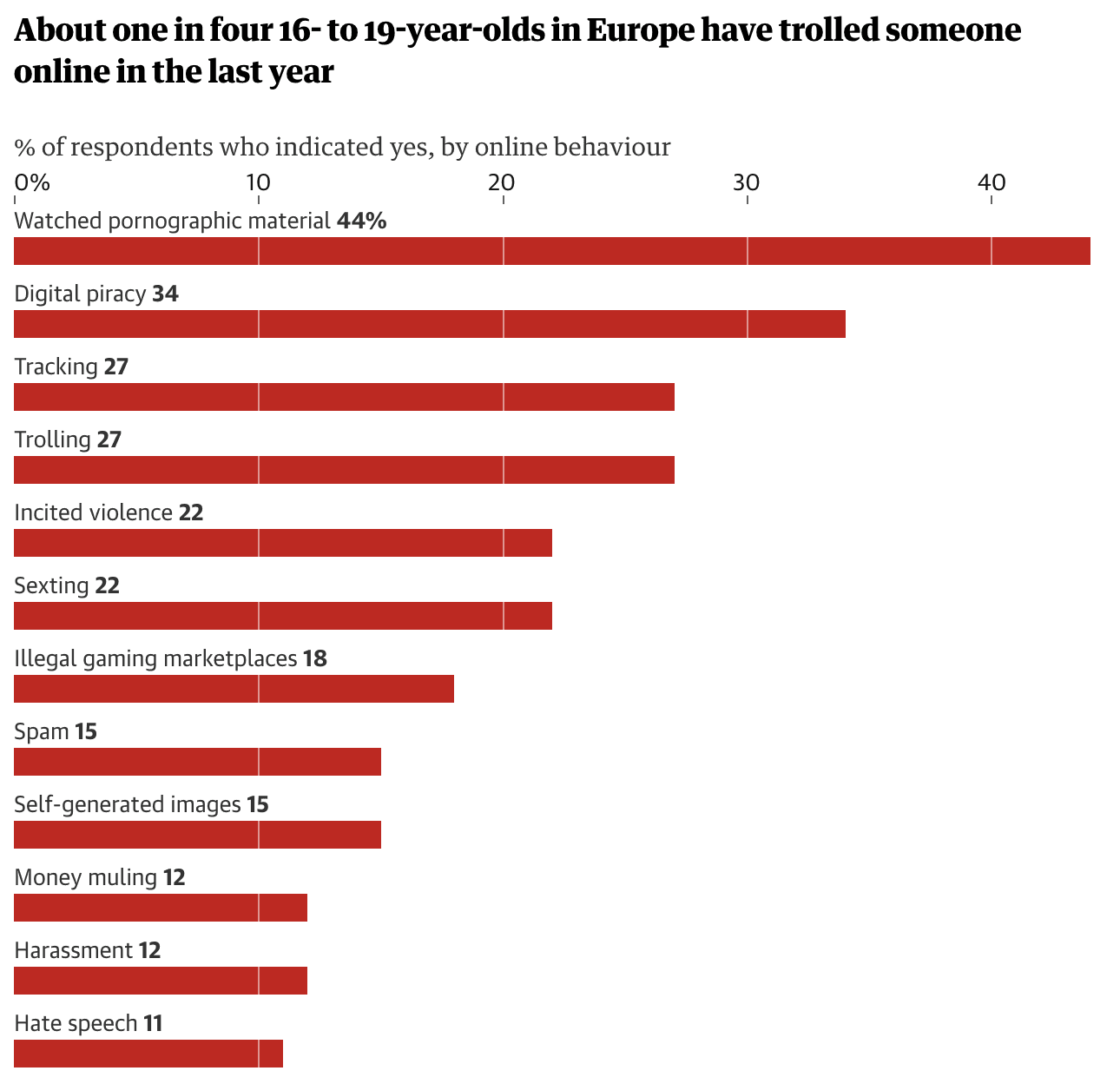Online Behaviours
Risky online behaviour ‘almost normalised’ among young people, says study
Jun 12, 2022
One EU-funded study found that one in four 16 to 19-year-olds have trolled someone online
One in three have engaged in digital piracy. This suggests that risky and criminal online behaviour risks becoming commonplace among a generation of young people across Europe.
A study funded by the EU found widespread criminal, risky, and delinquent behaviour among 16- to 19-year-olds in nine European nations, including the United Kingdom.
One in four teenagers responded to a survey of 8,000 young people and found that one in eight had engaged in online harassment, one in ten had engaged in hate speech or hacking, one in five had engaged in sexting, and one in three had engaged in digital piracy. Additionally, it found that four out of ten people have viewed pornography.
According to Julia Davidson, a co-author of the study and professor of criminology at the University of East London (UEL), a generation of European youth is increasingly engaging in risky and criminal online behaviour.
She stated, “The research indicates that a large proportion of young people in the EU are engaging in some form of cybercrime, to the extent that the conduct of low-level crimes online and the taking of online risks has become almost normalised.”

Guardian graphic. Source: Institute for Connected Communities. University of East London online harms and cybercrime unit.
Davidson, who drove the examination with her UEL partner Prof Mary Aiken, said the exploration discoveries highlighted more male cooperation in hazardous or criminal way of behaving, with almost 3/4 of guys confessing to some type of cybercrime or online gamble taking, contrasted and 65% of females.
The survey asked young people about 20 different online behaviours, such as looking at pornographic content, posting retaliatory porn, creating self-generated sexual images, and posting hate speech.
As per the review discoveries, simply under portion of members participated in conduct that could be viewed as criminal in many locales, for example, hacking, non-consensual sharing of cosy pictures or “cash muling” – where somebody gets cash from an outsider and passes it on, in a training connected to the returns of cybercrime.
The survey, which was carried out by a research company using sample groups that had already been used, found that half of 16- to 19-year-olds spent between four and seven hours a day online, and nearly four out of ten spent more than eight hours a day online, mostly on smartphones. It found that YouTube, Instagram, WhatsApp, TikTok, and Snapchat were the group’s top five platforms.
The United Kingdom, France, Spain, Italy, Germany, the Netherlands, Sweden, Norway, and Romania were the nine nations that participated in the survey. Spain had the highest percentage of what the study refers to as “cyberdeviancy,” which is a mix of criminal and non-criminal but risky behaviour. It was followed by Romania, the Netherlands, and Germany, all of which had about 72 percent. With 58%, the UK came in last.
The review was embraced in a joint effort with the cybercrime community at Europol, an EU body that works with wrongdoing organizations across the monetary coalition, and supported by the EU’s Frame of reference reserve. It asks that parents and children be taught more about what online behaviour can be risky and harmful.

A Milestone in Online Safety Legislation
The discoveries have been distributed against a setting of milestone online guideline in the EU and the UK. The online safety bill that is going back to parliament in the UK this week would make several new crimes. Deepfake pornography, which refers to images that have been manipulated to look like someone without their consent, and encouraging self-harm online are two examples.
Aiken stated: The bill on online safety is potentially ground-breaking because it addresses key issues that every nation faces. It might be the impetus needed to hold the tech industry accountable. A slew of important safeguards for children and young people are outlined in the bill; However, our findings suggest that accountability and prevention should receive greater attention, particularly in the context of young people’s online criminal behaviour.
The Digital Services Act, which was just approved by the EU, requires Google and large online platforms to take action against risks like cyber violence against women and online harm to children.
The information in this article was sourced from the Guardian.



